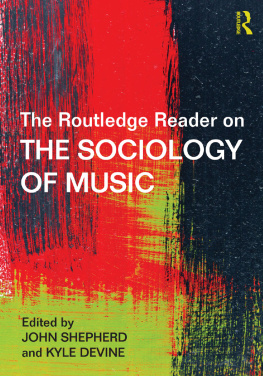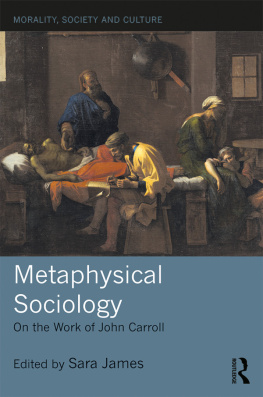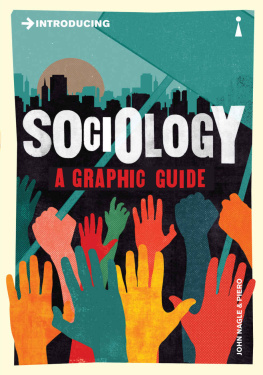ROUTLEDGE LIBRARY EDITIONS: SOCIAL THEORY
Volume 16
DISCOVERING SOCIOLOGY
DISCOVERING SOCIOLOGY
studies in sociological theory and method
JOHN REX
First published in 1973
This edition first published in 2015
by Routledge
2 Park Square, Milton Park, Abingdon, Oxon, OX14 4RN
and by Routledge
711 Third Avenue, New York, NY 10017
Routledge is an imprint of the Taylor & Francis Group, an informa business
1973 John Rex
All rights reserved. No part of this book may be reprinted or reproduced or utilised in any form or by any electronic, mechanical, or other means, now known or hereafter invented, including photocopying and recording, or in any information storage or retrieval system, without permission in writing from the publishers.
Trademark notice: Product or corporate names may be trademarks or registered trademarks, and are used only for identification and explanation without intent to infringe.
British Library Cataloguing in Publication Data
A catalogue record for this book is available from the British Library
ISBN: 978-0-415-72731-0 (Set)
eISBN: 978-1-315-76997-4 (Set)
ISBN: 978-1-138-78609-7 (Volume 16)
eISBN: 978-1-315-76366-8 (Volume 16)
Publishers Note
The publisher has gone to great lengths to ensure the quality of this reprint but points out that some imperfections in the original copies may be apparent.
Disclaimer
The publisher has made every effort to trace copyright holders and would welcome correspondence from those they have been unable to trace.
John Rex | Discovering sociology |
studies in sociological theory and method |
First published 1973
by Routledge & Kegan Paul Ltd
Broadway House, 6874 Carter Lane,
London EC4V 5EL and
9 Park Street,
Boston, Mass. 02108, U.S.A.
Printed in Great Britain by
Western Printing Services Ltd, Bristol
John Rex 1973
No part of this book may be reproduced in any form without permission from the publisher, except for the quotation of brief passages in criticism
ISBN 0 7100 7411 5
For Margaret, Kate, Helen, Freddie and David
The paradox of Sociology lies precisely in this, that though we are compelled by forces external to ourselves, these forces are nonetheless made by men and can be changed by men.
Contents
Acknowledgments
Most of the essays which are included in this volume have been given as lectures or broadcasts or published as papers before. are published here for the first time.
My thanks are due to Margaret Bass and Lesley Crone for typing the typescript and to Ivan Oliver for sorting out the footnotes.
Introduction
The essays which form the twenty chapters of this book have been written over a period of nearly fifteen years, but they have a certain consistency about them which, I hope, justifies their being collected in a single book. So far as the development of my own thought goes they may serve to bridge the gap between my first and very tentative book Key Problems of Sociological Theory (1961) and a more comprehensive and up-to-date work on which I am now engaged. I hope that they are also of much wider interest in that they exhibit a growing confidence in a nonpositivist type of sociology, as this non-positivist approach has gained widespread recognition since 1960.
When I wrote Key Problems it was still necessary to fight for the existence of sociology as a subject in British universities. Such sociology as there was, tended to be merged with other disciplines and with various ideologies, which were sufficiently acceptable to have been given house-room in the universities. Today this is no longer the case. As universities have expanded, new and old alike have created sociology departments, and although some appointments have been about as appropriate as appointing Durkheim to a Chair in Obstetrics, growing acquaintance with the literature of the subject by senior non-sociologists who were appointed, as well as by their more eager younger colleagues, has produced some degree of consensus as to what the subject is about. There is no absolute agreement, it is true, but there is sufficient overlap of interests, sufficient understanding of one school by another, to say that there is something called British sociology. In such circumstances (i.e. when one finds that one does have an actual public for ones views amongst ones colleagues), one feels less insecure and more willing to make ones own individual contribution more distinctive.
The original statement of my views brought two favourable responses, one less important than the other. The less important response was from Marxists and other radicals who saw in my recognition of the importance of disruptive conflict a line of thought which had been missing in British sociology. When, however, a wide variety of other sociological positions opened on the left or the conflict end of the political continuum, the theoretical perspective which my book advocated lost its uniqueness. Moreover, some of the new varieties of Marxism which took hold amongst student opinion were opposed to sociology as such, and my own approach, based as it was on one of the mainstreams of the sociological tradition, namely that of Weber, came to command less support on purely political grounds.
The more important favourable response, however, came from those who saw my approach as phenomenological rather than positivist. This led me to take a much deeper interest than I had done previously in the work of Alfred Schutz and his successors, such as Berger, Cicourel and Garfinkel in the United States, and in the anti-positivist tradition in Germany. The work of the American authors mentioned, greatly enriched my understanding of problems of sociological conceptualization, but I remained stubbornly convinced that, in two respects, the work of Weber aspired to two goals, which some of those interested in the phenomenology of everyday life were inclined to abandon. One was his insistence that a distinction could be made between the relative objectivity of the ideal types of action, formulated by sociologists, and the observed actors definition of the situation. The other was his use of his typologies, in a politically serious way, to draw comparisons between the structural features of major socio-economic and political systems in history. Because he stuck consistently to these goals, Weber never trivialized sociology and was not subject to the criticism which Marxists sometimes make of phenomenological sociology, namely that it deals only in false consciousness.
To say this, of course, is not to say that Weber gave a satisfactory account of the way in which his hypotheses could be given objectivity. Certainly there is strong reason to doubt whether he was right in suggesting that the sociologist should use causally adequate explanations in an attempt to supplement explanations adequate on the level of meaning. But many of those who have criticized Weber for doing this have failed to show what is meant by defining the objective of the human studies as giving an account of rule-governed behaviour, or as discovering the rules of the games which people play, when they speak to one another and interact with one another. What the critics seem to do, having seen that total objectivity is impossible, is to accept a total subjectivity of approach. There are simply a number of different ways of looking at any situation and all of them have equal validity. Not surprisingly, many of them are followers of Wittgenstein, who, having spent the earlier part of his career seeking the one true language with which to speak about the world, concluded, in the long run, that many language-games were possible.














